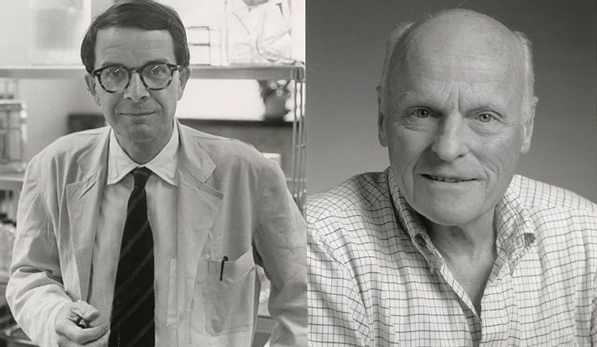Read the full story by Jennifer Durgin, published Jan. 26 by the Geisel School of Medicine.
In 1987, three Dartmouth Medical School scientists cofounded a successful biotech company, Medarex, based on their discoveries in the lab. Medarex went on to produce two of today’s leading antibody-based cancer therapies. Now, profits from that endeavor are supporting the annual Munck-Pfefferkorn Awards, which fund new biomedical research projects at the Geisel School of Medicine that have high potential to benefit patients and to generate future revenue through grants or entrepreneurial endeavors.

The endowment is named in honor of two luminaries from Dartmouth’s medical school: at left, Elmer Pfefferkorn, emeritus professor of microbiology and immunology, and Allan Munck, emeritus professor of physiology and neurobiology. (Photos courtesy of the Geisel School of Medicine)
Distribution from the Munck-Pfefferkorn endowment allowed Geisel to invest almost $1.2 million into eight different programs. The inaugural award recipients are focusing on a variety of areas, including priming the immune system to fight cancer, understanding which factors promote difficult-to-treat infections in the lungs, and revealing targets for the diagnosis and treatment of a rare autoimmune disease.
“The Munck-Pfefferkorn endowment fund was born in a spirit of supporting investigators to try new and innovative lines of investigation,” says Duane Compton, interim dean of Geisel. “I’m excited to see the variety of scientific projects that this endowment can help launch. It’s an invaluable tool for the school and its faculty.”
The endowment is named in honor of two luminaries from Dartmouth’s medical school: Elmer Pfefferkorn, emeritus professor of microbiology and immunology, and Allan Munck, emeritus professor of physiology and neurobiology.
“The impact that Elmer and Allan had on Dartmouth, on science, and on all of us cannot be overstated,” says Michael Fanger, emeritus professor of microbiology and immunology at Geisel and a cofounder of Medarex. “To see that impact extend to the next generations of researchers, clinicians, and patients is consistent with their legacies and all of our shared goals.”
